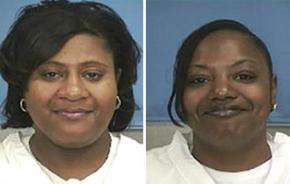Two life sentences for $11
talks about the campaign to free two women who languish in prison for a crime they did not commit.
TALK ABOUT injustice. How do you wind up in prison serving two life terms for a robbery that netted $11? That question has haunted first-time offenders Gladys and Jamie Scott for the past 15 years.
On December 24, 1993, Scott County Sheriff's Department in Mississippi arrested the sisters for an armed robbery they vehemently deny participating in. In 1994, they were convicted after being implicated in the crime by three young Black men who confessed to the robbery in exchange for a plea bargain that gave them 10 months. The sisters were not offered a plea and went to trial.
Time has passed slowly for these sisters as they watched from behind bars as their five children grew into adults and mourned the loss of their father. They have felt the pain of exhausting all their legal remedies while being denied relief at every level.
Nancy Lockhart, a legal analyst who has worked tirelessly over the years to help set free the Scott sisters, says she will never forget the frigid Chicago morning when she opened a letter from Mrs. Evelyn Rasco, the mother of the Scott sisters. She told the story of her daughters and her plight to help free them. "How can they give my daughters two life sentences for a crime that netted $11 where no one was injured?" she asked.

This prompted Lockhart to become the Scott sisters' lifeline for hope. She began a campaign to try to free them.
The Scott sisters challenged their convictions on direct appeal arguing that there was insufficient evidence for a conviction, and the guilty verdict was against the overwhelming weight of evidence, which should have exonerated them. But the appeals court found no error and affirmed the convictions on December 17, 1996. As a result, they filed a Petition for Writ of Certiorari to the U.S. Supreme Court, which was denied on May 15, 1997.
They consequently filed an Application for Leave to File Motion to Vacate Conviction, pursuant to the Mississippi Post-Conviction Collateral Relief Act. The Supreme Court also denied that application.
In 1998, one of the sentenced men signed an affidavit saying that the Scott sisters were not involved with the crime. The affidavit, along with two others that pointed to the sisters' innocence, were secured by their attorney and submitted for post-conviction relief. Then-attorney Chokwe Lumumba submitted a request for commutation of sentence and/or pardon to the governor. It was subsequently denied.
Gladys and Jamie Scott have maintained their innocence. They have spent nearly 15 years in prison for a crime they did not commit that netted the sum of $11. It is time for them to join their families.
First published at The Huffington Post.


